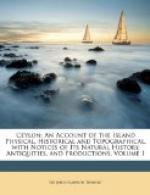[Footnote 1: Phoenicopterus roseus, Pallas.]
Floating on the surface of the deeper water, are fleets of the Anatidae, the Coromandel teal[1], the Indian hooded gull[2], the Caspian tern, and a countless variety of ducks and smaller fowl. Pelicans[3] in great numbers resort to the mouths of the rivers, taking up their position at sunrise on some projecting rock, from which to dart on the passing fish, and returning far inland at night to their retreats among the trees which overshadow some ruined watercourse or deserted tank.
[Footnote 1: Nettapus Coromandelianus, Gmel.]
[Footnote 2: Larus brunnicephalus, Jerd.]
[Footnote 3: Pelicanus Philippensis, Gmel.]
Of the birds familiar to European sportsmen, partridges and quails are to be had at all times; the woodcock has occasionally been shot in the hills, and the ubiquitous snipe, which arrives in September from Southern India, is identified not alone by the eccentricity of its flight, but by retaining in high perfection the qualities which have endeared it to the gastronome at home. But the magnificent pheasants which inhabit the Himalayan range and the woody hills of the Chin-Indian peninsula, have no representative amongst the tribes that people the woods of Ceylon; although a bird believed to be a pheasant has more than once been seen in the jungle, close to Rambodde, on the road to Neuera-ellia.
List of Ceylon Birds.
In submitting this catalogue of the birds of Ceylon, I am anxious to state that the copious mass of its contents is mainly due to the untiring energy and exertions of my friend, Mr. E.L. Layard. Nearly every bird in the list has fallen by his gun; so that the most ample facilities have been thus provided, not only for extending the limited amount of knowledge which formerly existed on this branch of the zoology of the island; but for correcting, by actual comparison with recent specimens, the errors which had previously prevailed as to imperfectly described species. The whole of Mr. Layard’s fine collection is at present in England.
Accipitres.
Aquila Bonelli, Temm.
pennata, Gm.
Spizaetus Nipalensis, Hodgs.
limnaeetus, Horsf.
Ictinaetus Malayensis, Reinw.
Haematornis cheela, Daud.
spilogaster, Blyth.
Pontoaetus leucogaster, Gm.
ichthyaetus, Horsf.
Haliastur Indus, Bodd.
Falco peregrinus, Linn.
peregrinator, Sund.
Tinnunculus alaudarius, Briss.
Hypotriorchis chicquera, Daud.
Baza lophotes, Cuv.
Milvus govinda, Sykes.
Elanus melanopterus, Daud.
Astur trivirgatus, Temm.
Accipiter badius, Gm.
Circus Swainsonii, A. Smith.
cincrascens, Mont.
melanoleucos, Gm.
aeruginosus, Linn.
Athene castonatus, Blyth.
scutulata, Raffles.
Ephialtes scops, Linn.
lempijii, Horsf.
sunia, Hodgs.
Ketupa Ceylonensis, Gm.
Syrnium Indranee, Sykes.
Strix Javanica, Gm.




